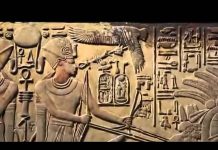The lavish and lengthy production of PBS’s The Greeks: Crucible of Civilization is a fitting tribute to the glory of ancient Greece, telling the story of Greek democracy from its first stirrings in 500 B. C. through to the cataclysmic wars that virtually destroyed the empire. It concludes with a fascinating look at how the Greeks were defeated, yet their philosophy endured and changed the world forever. Beautifully photographed, and with intelligent narration delivered by actor Liam Neeson, this documentary goes into considerable detail while also being engaging to the eye as well as the mind. The photography at ancient sites is often spectacular and judicious use of actors filmed in re-creations of critical events provide immediacy. Much of the story relates how the Greeks essentially invented politics and democracy, and interviews with prominent scholars of classical history provide insight into the major characters, including Thales, Pericles, and Socrates. The stories of epic battles on land and sea and a thoughtful treatment of the Greek ideals of heroism are presented well. But the documentary particularly succeeds in the latter stages, when the story turns to the downfall of Socrates and a thoughtful explanation of how Greek philosophy transformed civilization.
POPULAR PICKS
LATEST ADDITIONS
© Copyright 2017-2022 - Gratis Global Ltd. All rights reserved.

































